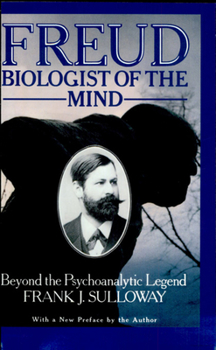Freud, Biologist of the Mind: Beyond the Psychoanalytic Legend, with a New Preface by the Author
Select Format
Select Condition 
Book Overview
In this monumental intellectual biography, Frank Sulloway demonstrates that Freud always remained, despite his denials, a biologist of the mind; and, indeed, that his most creative inspirations... This description may be from another edition of this product.
Format:Paperback
Language:English
ISBN:0674323351
ISBN13:9780674323353
Release Date:January 1992
Publisher:Harvard University Press
Length:638 Pages
Weight:1.85 lbs.
Dimensions:1.4" x 6.2" x 9.3"
Customer Reviews
2 ratings
Through this marvel we do remember him and his flock that once soared.
Published by Thriftbooks.com User , 18 years ago
Dr. Frank Jones Sulloway's award winning, 1979 tome, "Freud, Biologist of the Mind," has been approached with a degree of ambiguity. Sulloway, a Harvard graduate and historian of science, contends that psychoanalysis, by dispelling myths hovering around a Viennese neuropathologist--Sigismund Schlomo Freud, can be best comprehended by unearthing the biological roots which implicated or inspired its ideology. He says that this would then make psychoanalysis founder Freud a "crypto-biologist" (his true biological focus obscured), and psychoanalysis a "sophisticated 'psychobiology'"--a position heretofore not ostensibly presented by biographers and scientific historians. In the September, 1979 issue of "Psychology Today," fellow historian Paul W. Robinson lavished encomium for at least the punctilious, scholarly analysis Sulloway employed in his book. Later, he attempted to debunk his psychobiological thesis in a 1993 work, "Freud and His Critics." Those in the humanities decried it too, for--as they saw it, Sulloway overemphasized the biological dimension, which was merely one major aspect of psychoanalytic thought. And those in sociobiology protested as well, stating Sulloway intended for psychoanalysis to cooperate with them directly; however, it was only their shared connections with evolutionary theory that were transparent. According to the author, "crypto-biology," the first great myth-complex, announced that the influence of biology upon psychoanalysis affected its terminology, not in deductively spawning its essential concepts; conversely, its impact stemmed from clinical and psychological observations. Sigmund Freud could then be perceived as a "pure psychologist," i.e., possessing a mainly psychological methodology, enabling him to mold an independent science based on empiricism, in lieu of theoretical hypothesizing (which he sometimes did). This was so the scientific establishment would not inculpate him of being speculative, therefore accepting him and his creation. Also, the myth was utilized strategically to counteract rival theories within the psychoanalytic movement, such as the disavowal of infantile sexuality, which some believed was biologically untenable, saying that the notion of infants seeking pleasure was not tantamount to sexuality; Freud's concept of libido, or sexual energy, really being a desexualized, nutritive instinct used to care for offspring. Sulloway maintains that Freud owed a debt in numerous areas to biologist Charles Robert Darwin, particularly the latter's positions on child psychology, with their evolutionary flavour. (See also psychologist Robert Thomson's "The Pelican History of Psychology," from 1968, wherein Darwin's contribution to psychology is outlined.) Darwin's observations on the issuing of emotions in childhood, such as the inherited fears of large animals, support Freud's contention that neurotic phobias were phylogenetically endued. As a corollary, Freud thought that babies possess
well written and researched
Published by Thriftbooks.com User , 24 years ago
I found this to be a very well written and researched bookwith extensive documentation to support the author's work. This isnot a Freud bashing book in the Fredrick Crewes model at all. I found it to be more of a historical documentation of the development of and influence's on Freud's theories. It discusses in more detail than I have seen elsewhere how Fliess (among many others) influenced Freud's thinking. The only reason I can surmise someone would react negatively to this book is if they cannot tolerate the realization that Freud was not working in a vacuum and many of his ideas were not unique to him (such as infantile sexuality) although his theories were more comprehensive and extensive in their scope. For anyone interested in the history of psychiatry, psychoanalysis and Freud, I highly recommend this book. END





